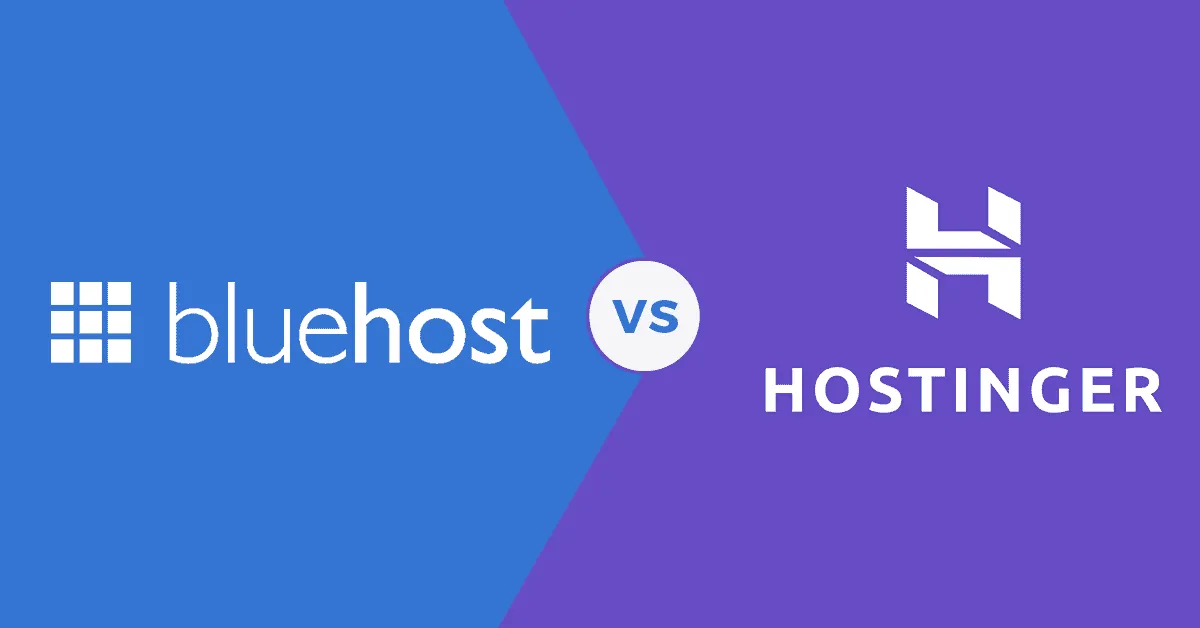
Hostinger vs Bluehost: Best Review for 2024
Introduction to Hostinger vs Bluehost comparison
In the digital age, having a robust online presence is crucial for success, and at the heart of this presence is a reliable web hosting service. Web hosting forms the foundation of websites, offering the necessary resources and services to make them accessible on the internet. The right web hosting provider can significantly affect a website’s performance, affecting everything from load speeds to uptime, crucial factors in user experience and search engine rankings.
In this review, we delve into a comprehensive comparison of two widely recognized web hosting giants: Hostinger and Bluehost. Both have carved out substantial niches in the web hosting market, known for their unique blend of features, performance, and pricing. Our goal is to dissect these providers under various critical aspects, providing a clear picture of what each one offers.
This review is conducted with a methodology that includes hands-on testing, extensive market research, and analysis of real user feedback. By doing so, we aim to offer an objective perspective that helps readers make an informed decision when choosing between Hostinger and Bluehost for their web hosting needs.
Table of Contents
Company Backgrounds: Hostinger vs Bluehost
Hostinger
- History and Background: Hostinger began its journey in 2004 in Lithuania. Initially, it started as a free web hosting service known as “000webhost.” Over the years, it evolved, rebranding as Hostinger in 2011 and expanding its services globally. Hostinger is now known for its affordable plans and user-friendly approach, catering to a broad audience ranging from beginners to seasoned webmasters.
- Market Position and Reputation: Hostinger has made a name for itself in the world of web hosting with a strong emphasis on affordability without compromising quality. It’s particularly favored by those looking for a balance between cost and performance, especially for small to medium-sized businesses and personal websites.
Bluehost
- History and Background: Bluehost, established in 2003, is headquartered in Provo, Utah. It has grown to become one of the largest hosting companies, with a strong focus on WordPress hosting. Bluehost is often recommended for WordPress websites due to its integration and partnership with WordPress.org.
- Market Position and Reputation: Bluehost stands out for its robust infrastructure, reliability, and excellent WordPress integration. It is widely recognized as a suitable choice for both new and established websites, particularly those using WordPress. The company’s reputation is built on its consistent performance and strong customer support system.
In summary, both Hostinger and Bluehost bring unique strengths to the table. Hostinger appeals to those seeking affordability and ease of use, while Bluehost is known for its WordPress expertise and reliable performance. Our review aims to further dissect these aspects, helping you decide which provider aligns best with your web hosting needs.
Hosting Plans and Pricing: Hostinger vs Bluehost
When choosing a web hosting provider, understanding the variety of hosting plans and their pricing is critical. Both Hostinger and Bluehost offer a range of plans, catering to different needs and budgets.
Hostinger’s Plans:
- Hostinger’s offerings range from shared hosting, ideal for small to medium-sized websites, to more robust VPS and cloud hosting options for sites requiring more resources.
- Their pricing is known for being highly competitive, often making it the go-to choice for those on a tight budget.
- Hostinger frequently runs special promotions and discounts, particularly for long-term commitments, making their plans even more affordable.
- The value for money is notable, especially for startups and individual bloggers who might not require extensive resources initially.
Bluehost’s Plans:
- Bluehost’s array of plans includes shared hosting, VPS, dedicated hosting, and specialized WordPress hosting.
- The pricing is slightly higher compared to Hostinger, reflecting its focus on providing comprehensive WordPress solutions and higher performance benchmarks.
- Bluehost also offers promotional pricing for new customers, though their regular rates are higher post the initial term.
- Their plans are generally viewed as offering good value, especially for WordPress users and businesses looking for reliable hosting with strong support.
Target Audience for Each Plan:
- Hostinger’s low pricing and simple interface make it ideal for beginners, small businesses, and personal websites.
- Bluehost, with its WordPress-centric approach and robust hosting options, is better suited for WordPress users and medium to large businesses requiring dependable performance.
Performance and Uptime: Hostinger vs Bluehost
Performance and uptime are crucial indicators of a web hosting provider’s quality. They directly impact user experience and SEO rankings.
Hostinger’s Performance:
- Hostinger has made significant strides in server performance, offering solid speed and reliability.
- Uptime is generally high, with the company maintaining a 99.9% uptime guarantee, a standard in the industry.
- Case studies and user reviews often highlight Hostinger’s consistent performance, particularly for shared hosting.
Bluehost’s Performance:
- Bluehost is recognized for its robust performance, particularly in managed WordPress hosting.
- They also uphold a 99.9% uptime guarantee. Real-world tests and user feedback often underscore Bluehost’s reliability and speed, especially for WordPress sites.
- Bluehost’s servers are optimized for WordPress, ensuring enhanced performance for websites built on this platform.
Both Hostinger and Bluehost exhibit strong performance and uptime metrics, but Bluehost takes a slight edge, particularly for WordPress sites. Hostinger, however, holds its own with consistently good performance, making it a strong contender, especially for those conscious of budget constraints.
Features and Tools: Hostinger vs Bluehost
The range of features and tools offered by a hosting provider can significantly influence user experience and website performance. Both Hostinger and Bluehost offer a variety of features, but they cater to different user needs.
Website Builder, WordPress Integration, and Control Panels:
- Hostinger offers a user-friendly website builder, making it easy for beginners to create websites. Its control panel, hPanel, is intuitive and easy to navigate. WordPress integration is smooth, with one-click installations and optimizations for better performance.
- Bluehost is renowned for its seamless WordPress integration, being an official WordPress.org recommended host. It offers a customized control panel that is geared towards WordPress users, making site management straightforward. Bluehost also provides a feature-rich website builder integrated with WordPress.
Additional Tools:
- Both Hostinger and Bluehost provide essential tools like SSL certificates and backups. Hostinger offers free SSL certificates across all plans, while Bluehost includes free SSL in some plans.
- Regarding backups, Hostinger provides weekly backups for some plans, whereas Bluehost offers more frequent backups in higher-tier plans.
- Security features are robust in both, with Hostinger offering BitNinja Smart Security and Bluehost providing SiteLock on select plans.
Ease of Use and Beginner-Friendliness:
- Hostinger’s interface is particularly beginner-friendly, with easy navigation and setup.
- Bluehost, while slightly more advanced, still maintains a user-friendly experience, especially for those familiar with WordPress.
Customer Support and Resources: Hostinger vs Bluehost
Customer support is a critical component of any hosting service, as it ensures users receive timely assistance for their queries and issues.
Customer Support Options:
- Hostinger provides support through a 24/7 live chat and a comprehensive knowledge base. However, it lacks phone support, which can be a drawback for those preferring direct calls.
- Bluehost offers a range of support options, including 24/7 live chat, phone support, and a well-stocked knowledge base. The availability of phone support is a significant advantage for users who prefer verbal communication.
Response Times and Quality of Support:
- Hostinger’s live chat generally has quick response times, and the quality of support is appreciated by users, though the lack of phone support is sometimes noted as a limitation.
- Bluehost is known for its responsive and helpful support team, with both live chat and phone support receiving positive feedback for efficiency and expertise.
Educational Resources and Community Support:
- Both providers offer extensive educational resources. Hostinger has tutorials, guides, and a blog that provides valuable information for users.
- Bluehost also offers a wealth of educational content, including guides, video tutorials, and a blog. Additionally, Bluehost’s strong community forums provide a platform for user discussions and peer support.
In summary, while both Hostinger and Bluehost offer a comprehensive set of features and tools, Hostinger is more budget-friendly and beginner-oriented, whereas Bluehost provides more advanced features and excellent WordPress integration. In terms of customer support, Bluehost’s additional phone support and extensive educational resources give it a slight edge over Hostinger.
Pros and Cons: Hostinger vs Bluehost
In this section, we summarize the major pros and cons of both Hostinger and Bluehost based on our comprehensive analysis and personal experiences.
Hostinger:
Pros:
- Affordability: Hostinger offers some of the most budget-friendly hosting plans, making it an excellent choice for individuals and small businesses.
- User-Friendly Interface: The hPanel is intuitive and easy to navigate, ideal for beginners.
- Good Performance: Offers reliable uptime and decent loading speeds, providing good overall performance.
- Free SSL Certificate: SSL certificates are included for free across all plans.
Cons:
- Limited Resources on Lower Plans: The most affordable plans come with limitations in terms of bandwidth and storage.
- No Phone Support: Lack of direct phone support might be a downside for users preferring verbal communication.
- Weekly Backups in Some Plans: Daily backups are not standard across all plans.
Bluehost:
Pros:
- Strong WordPress Integration: Officially recommended by WordPress.org, it offers seamless integration and excellent support for WordPress websites.
- Reliable Performance: Known for consistent uptime and robust server performance.
- Comprehensive Support Options: Offers 24/7 live chat and phone support, providing versatile assistance.
- Educational Resources: Extensive knowledge base, tutorials, and community support.
Cons:
- Higher Pricing Post Initial Term: Promotional prices rise significantly after the first term.
- Site Migrations Not Free: Unlike some competitors, Bluehost charges for site migrations.
- Upselling Tendencies: Users may experience frequent prompts for upgrades or additional services.
Personal Opinions/Experiences: [Insert personal experiences or opinions here, if applicable, to provide a unique perspective to your readers.]
User Reviews and Testimonials: Hostinger vs Bluehost
To provide a well-rounded view, it’s important to consider user reviews and testimonials from various platforms.
Hostinger User Reviews:
- Generally, Hostinger receives positive feedback for its affordability and user-friendly interface.
- Users often commend the service for its value for money, especially suitable for small websites and beginners.
- However, some users have noted limitations with the lower-tier plans and the absence of phone support.
Bluehost User Reviews:
- Bluehost is frequently praised for its reliability and WordPress-centric features.
- The customer support, especially the availability of phone support, is often highlighted as a major plus.
- On the downside, users have expressed concerns about the higher renewal rates and additional charges for services like site migration.
Testimonials and Case Studies:
- Notable testimonials for both services can be found on their respective websites and third-party review sites.
- Case studies, particularly for Bluehost, often showcase successful WordPress sites, emphasizing its strengths in this area.
Customer Satisfaction Levels:
- Overall, both Hostinger and Bluehost exhibit high levels of customer satisfaction, each excelling in areas suited to their target audiences.
- Hostinger’s appeal lies in its affordability and ease of use for beginners, while Bluehost is preferred for its robust WordPress features and reliable performance.
Recommendations and Final Verdict
After thorough analysis, it’s time to offer recommendations and conclude which hosting provider, Hostinger or Bluehost, offers the best value in 2024.
Personal Recommendation: Based on the comprehensive review, the choice between Hostinger and Bluehost largely depends on the specific needs and budget of the user.
- For Beginners and Small Websites: Hostinger is highly recommended due to its affordability, ease of use, and decent performance. It’s an excellent starting point for those venturing into web hosting without a hefty investment.
- For WordPress Users and Larger Websites: Bluehost stands out as the go-to option, especially for those who prioritize robust WordPress integration, reliable performance, and comprehensive support.
Final Verdict: In terms of overall value, Hostinger offers incredible affordability and is ideal for users with basic hosting needs. However, for those who require more advanced features, particularly for WordPress sites, Bluehost provides superior service despite a higher cost.
Conclusion
To recap, Hostinger shines with its budget-friendly plans and user-friendly approach, making it suitable for beginners and small to medium-sized websites. On the other hand, Bluehost excels with its strong performance, WordPress integration, and excellent customer support, catering well to WordPress users and larger websites.
Both Hostinger and Bluehost have their unique strengths and cater to different segments of the market. The choice depends on your specific requirements, budget, and the scale of your project.
Additional Advice:
- Always consider the long-term costs, not just the promotional prices.
- Evaluate your technical needs and support requirements before deciding.


